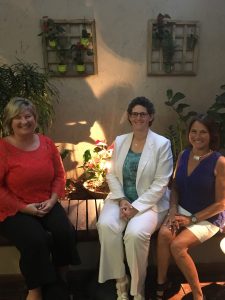Critical Research in Health and Healthcare Inequities
in Rio de Janiero
Flying over Rio de Janiero is on many a paraglider’s bucket list, so when expert glider and School of Nursing professor Dr Colleen Varcoe was invited to speak at a Sexual Violence Research Initiative (SVRI) conference in Brazil this year, she did not hesitate to accept.
 In spite of its name, the coordinating office of SVRI, based in South Africa, is not interested only in sexual violence. The conference was open to very broad studies on violence against women. However, in spite of a huge epidemic of violence against Indigenous women globally, Dr Varcoe was the only invitee whose studies centre on that topic.
In spite of its name, the coordinating office of SVRI, based in South Africa, is not interested only in sexual violence. The conference was open to very broad studies on violence against women. However, in spite of a huge epidemic of violence against Indigenous women globally, Dr Varcoe was the only invitee whose studies centre on that topic.
Dr Varcoe’s conference presentation was well received, but the paragliding event over Rio ran into a glitch. Violence had erupted over the favelas, and the Varcoe party was encouraged to glide in a different direction, preventing them from flying over some of the most iconic points of interest, such as Christ the Redeemer atop Corcovado.
Violence within the favelas in Rio is so common that the broader population often normalizes the violence, dismissing the importance as being confined to members of drug cartels and other criminals. And this brings us to the other facet of Dr Varcoe’s visit to Brazil. She had received an additional invitation to speak, this time at a conference arranged by Canada’s Consul General to Rio de Janiero, Evelyne Coulombe.
Coulombe received her MBA at UBC, but her BSc in civil engineering was granted from L’École Polytechnique in 1994 — five years after the massacre at that university, which took the lives of 14 women and injured ten more. Her mandate for the Canadian government is to increase trade with Brazil, but Coulombe is particularly interested in preventing violence against women, and is especially concerned about the victims of violence in Rio; violence that arises from poverty and glaring inequities among groups that foster the drug trade. Aware of the upcoming SVRI conference, Coulombe called on her connections to local organisations in Rio to develop the Roundtable on Violence Against Women, at which visiting Canadian researchers would be invited to present while they were in town.
Dr Varcoe presented alongside fellow Canadian Dr Susan Jack, a nursing professor from McMaster University whose research is in child maltreatment. It soon became very clear to the Canadian delegation that the presence of two foreign researchers was being deployed in part to bring cachet and authority to an event that was in truth, a lure to encourage dialogue among local authorities and activists who were also invited to present. The true design of the Roundtable was to create space to connect the parties in Rio who should be talking and working toward resolution of the problem of extreme violence. Among the ten or so local presenters were the Chief of Police of Rio’s “Women’s Precinct” — a division specifically created to serve the female population; a lieutenant in the Brazilian army; and Cecilia Olliveira, a journalist from The Intercept who had been tracking levels of violence by collecting data from Google Analytics and other sources.
The journalist’s presentation was the most compelling for Dr Varcoe. Olliveira showed a map of the city of Rio de Janiero, over which was superimposed separate arrays that showed first, gunfire, then number of deaths by violence, and then, the location of schools and daycares. The visuals were stunning — using data that is readily accessible to anyone, she showed that the people being harmed in the most violent parts of the city included women and children going about their everyday business. Speaking directly to the chief of police (who was present), she argued that this information should be gathered and implemented by those in authority to tell the story of the real victims of the drug wars, and to offer better context for developing competent strategies for ending the violence.
The trip was not what she had expected, but Dr Varcoe is thrilled to have been an instrument in the service of the Canadian government and Consulate in Rio de Janiero in bringing together a disparate group of women to challenge, empower, and impel them to action.
Colleen Varcoe
